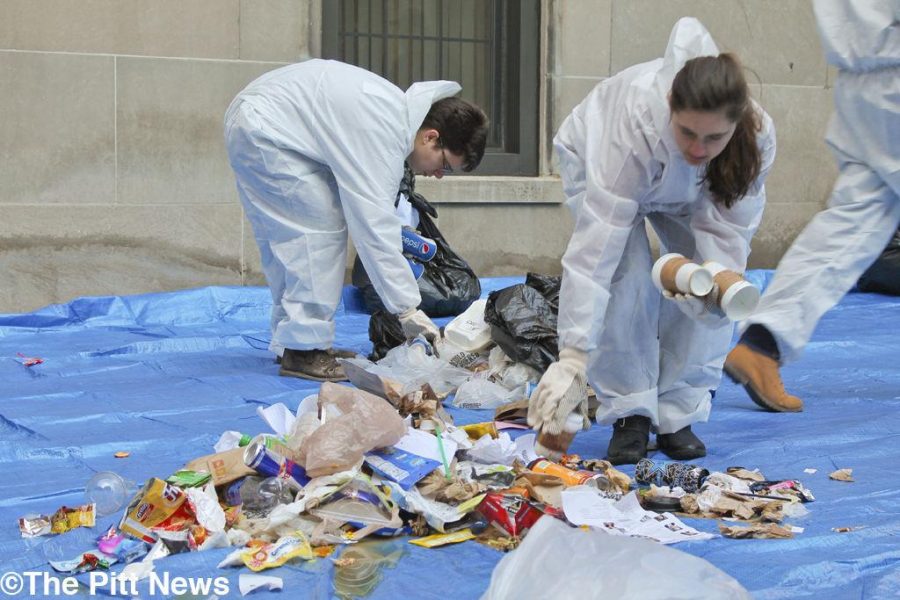Trash picking for a cause: Recyclemania continues at Pitt
February 5, 2015
The courtyard between Towers Patio and the William Pitt Union got trashy on Wednesday morning.
Student group Free the Planet, as well as other environmental student groups and campus sustainability leaders, coordinated a “waste audit” between 11:30 a.m. and 12:45 p.m. The event, organized with the Office of Facilities Management, was a part of RecycleMania, an eight-week period during which 600 colleges and universities around the country compete to generate the least waste and the most recycled items in that period of time. Last year’s RecycleMania produced 740,460 pounds of recycling at Pitt and 85.6 million pounds of recycling and composting nationwide.
The waste audit was “all about visibility,” student sustainability coordinator Sage Lincoln said.
For the audit, three students donned white hazmat suits and matching canvas gloves to rummage through the trash bags picked up from Towers Lobby, the Union, Posvar Hall and other high-traffic locations around campus, creating separate piles: one for recyclable items, one for compostable food and another for waste.
These self-proclaimed “Ghostbusters,” resembling the film characters in their puffy Tyvek onesies, are a part of the Pitt Student Environmental Action Coalition. The Coalition is a conglomeration of five student groups: Fair Food Cooperative, Global Environmental Brigades, Free the Planet, Students for Sustainability and Take Back the Tap.
The Coalition meets Wednesday nights to discuss ways in which it can better educate the student body about environmental issues and make Pitt’s campus a more earth-friendly place.
“It’s great because you can get involved in other peoples’ groups and projects,” Arielle Berk, a Take Back the Tap member, said.
Lincoln has worked diligently to increase the consistency and transparency of recycling facilities on campus.
Along with adding 100 new recycling bins around campus, including in Nordenberg dorm rooms, she travelled dorm-to-dorm, reviewing the recycling and waste resources in an effort to transform the entire University into a single-stream recycling system where glass, paper and plastic can all go into the same bins.
Free the Planet co-Presidents Beth Pindilli and Claire Matway spent more than an hour plucking old banana peels and damp Pizza Hut boxes from the heap.
In the end, the recyclable pile — comprised of Pepsi and Starbucks cups, plastic bottles, receipts and loose paper — was almost equal in size to the amount of waste.
The reason so many of these items don’t make it to the trash can isn’t limited to students who don’t recycle, according to Pindilli, a sophomore English literature, history and political science major.
“[Reducing consumption] is something that isn’t ingrained in our society,” Pindilli said. “There are a lot of little things that could be done that would reduce our waste by a whole lot, but the students don’t know they’re available and they aren’t always easily done.”
Paul Heffernan, president of Students for Sustainability, agreed that many students lack knowledge about recycling and sustainability, making decisions that reduce waste and understanding why those decisions are important.
“Students are 17 or 18 years old by the time they get to college. They should know,” Heffernan, a senior environmental studies major, said.
Heffernan added that the real goal is for “all of the piles to be smaller next year,” highlighting a sentiment expressed by each of the students involved — a focus on limiting consumption should come before choosing whether to recycle or not.
The best advice to be more environmentally conscious is to “Stop producing that much waste in the first place,” Lincoln said.








